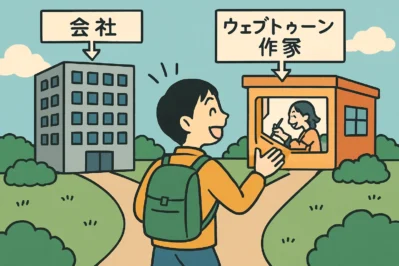From “Plan A” to “Plan B”? How to Talk About Changing Your Career in Korean!
Hello! This is Maeil Hangul (매일한글), here to upgrade your Korean skills!
Have you ever changed your major in university? Or perhaps you’re thinking about a completely new career path? These are big life decisions, and being able to explain them in Korean is a fantastic skill to have, whether you’re talking to friends or even in a job interview.
Lately in Korea, there’s a huge trend of people exploring new paths that truly fit their passions. The idea of a single “lifelong job” (평생 직장) is changing, and many are courageously switching tracks to find work that makes them happy. Today, let’s learn the essential Korean expressions to talk about this exciting journey of change and adaptation!
Core Expressions You Need to Know
Here are three key expressions to help you explain your reasons for changing your major or career.
1. 적성에 안 맞다 (It doesn’t suit my aptitude)
- Pronunciation [Romanization]: Jeokseong-e an matda
- English Meaning: To not be a good fit for one’s aptitude; to not be cut out for something.
- Detailed Explanation: This is the most common and natural way to say that something isn’t right for you.
적성(jeokseong) means more than just “interest”; it refers to your natural talent, personality, and suitability for a certain type of work or study. Saying적성에 안 맞다is a polite and understandable reason for a change, focusing on the mismatch rather than simply saying “I didn’t like it.” -
💡 Pronunciation Tip:
The magic happens in the word맞다(matda). When the letterㅈ(j) is at the end of a syllable block (a position called받침), its sound changes to a ‘t’ sound. So,맞is pronounced like [맏/mat]. Then, when it’s followed by다(da), theㄷ(d) sound becomes a strong, tense sound, like [따/tta]. So,안 맞다is not pronounced an maj-da, but rather [안 맏따 / an mat-tta]. This makes your Korean sound much more natural!
2. -(으)ㄹ까 하다가 (I was thinking of doing… but then…)
- Pronunciation [Romanization]: -(eu)lkka hadaga
- English Meaning: I was considering/thinking of doing [verb], but then…
- Detailed Explanation: This grammar pattern is perfect for showing a change of mind. It expresses that you considered one option but ultimately chose another. It beautifully captures the feeling of hesitation and the final decision-making process. You attach it to a verb stem.
- Verb stem ends in a vowel (e.g., 가다): 갈까 하다가 (galkka hadaga) – I was thinking of going, but…
- Verb stem ends in a consonant (e.g., 먹다): 먹을까 하다가 (meogeulkka hadaga) – I was thinking of eating, but…
3. 진로를 바꾸기로 결심했어요 (I decided to change my career path)
- Pronunciation [Romanization]: Jillo-reul bakkugi-ro gyeolsimhaesseoyo
- English Meaning: I decided to change my career path.
-
Detailed Explanation: This is a powerful, complete sentence that clearly states your decision. Let’s break it down:
진로(jillo): Career path / future course바꾸다(bakkuda): To change-기로 결심하다(gi-ro gyeolsimhada): A grammar pattern meaning “to decide to do (verb).”
You can swap out진로를 바꾸다with other phrases like전공을 바꾸다(to change one’s major) or회사를 그만두다(to quit the company).
- 💡 Pronunciation Tip:
In the word결심(gyeolsim), theㅅ(s) sound that follows theㄹ(l) 받침 becomes tense. So, instead of a soft ‘sim’, it’s pronounced as a strong [씸/ssim]. The full phrase sounds like [결씸해써요 / gyeol-ssim-hae-sseo-yo]. This tensing rule is very common in Korean!
Example Dialogue
Let’s see these expressions in a real conversation!
A: 민준 씨, 대기업 그만뒀다고 들었어요. 요즘 뭐 해요?
(Minjun, I heard you quit your job at the big company. What are you up to these days?)
B: 아, 소라 씨! 네, 맞아요. 회사 일이 제 적성에 너무 안 맞더라고요.
(Oh, Sora! Yes, that’s right. The company work really didn’t suit my aptitude.)
A: 정말요? 그래도 안정적인 직장이었잖아요.
(Really? But it was such a stable job.)
B: 네, 그래서 계속 다닐까 하다가… 정말 하고 싶은 일을 해야겠다고 생각했어요. 그래서 웹툰 작가가 되기로 결심했어요!
(Yes, so I was thinking of continuing to work there, but… I realized I should do what I really want to do. So I decided to become a webtoon artist!)
A: 우와, 정말 멋있어요! 꿈을 좇는 거네요!
(Wow, that’s so cool! You’re following your dream!)
Culture Tip: The “N-Jobler” & Finding Your 적성
In Korea, the younger generation (often called the MZ 세대) has a different perspective on careers compared to their parents. The idea of a 평생 직장 (pyeongsaeng jikjang – a job for life) is fading.
Instead, trends like becoming an N잡러 (N-jobler)—a person with ‘N’ number of jobs—are on the rise. People are no longer afraid to leave a stable but unfulfilling job to find their 적성 (jeokseong – aptitude). They value 워라밸 (worabel – work-life balance) and personal satisfaction.
So, when you use the expressions we learned today, you’re not just speaking correct Korean; you’re also tapping into a major cultural shift happening in Korea right now! Explaining that you changed paths because it “didn’t fit your aptitude” is seen as a mature, self-aware, and courageous reason.
Let’s Practice!
Ready to try it yourself? Review what we learned and tackle these quick questions!
1. Fill in the blank:
저는 원래 변호사가 되고 싶었어요. 그런데 법 공부가 제 ______ ___ ______, 지금은 요리사로 일하고 있어요.
(I originally wanted to be a lawyer. But studying law _______, so now I work as a chef.)
2. Make your own sentence:
Think about a big decision you made recently. It could be about studying, work, or even a hobby! Create a sentence using the grammar pattern -기로 결심했어요.
Great job today! Learning to talk about your life story is a huge step in becoming fluent.
Share your answers to the practice questions in the comments below! We’d love to see what you decided to do!






